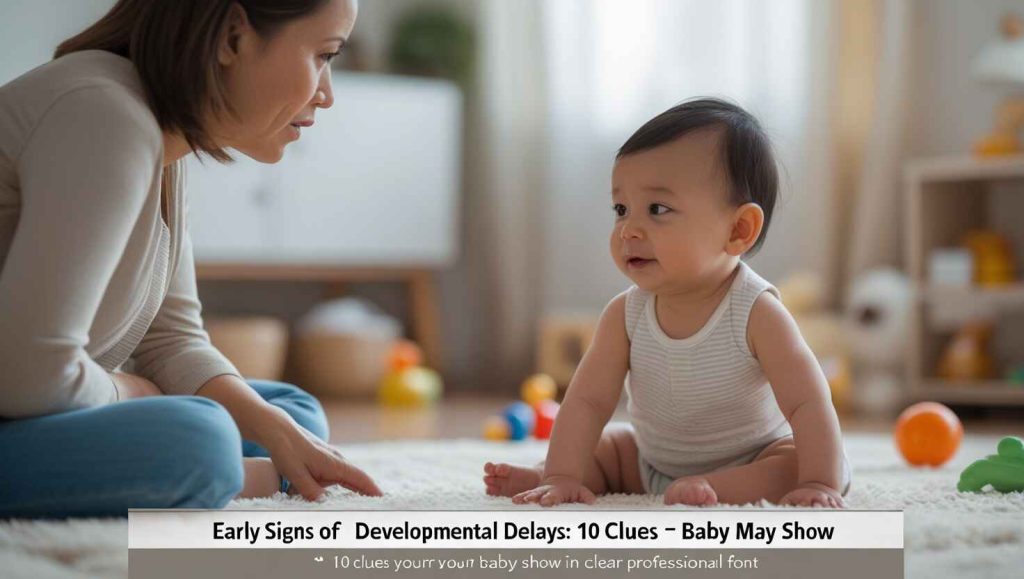Each parent naturally wants their child to develop emotionally, physically, and intellectually in the best way. Basically, the first three years are vital for brain growth. Early signs of developmental delay may include 10 key clues that show possible understanding of things.

This article highlights 10 clues your baby may show to help parents recognize when to seek early help. Early detection plays a crucial role because it allows you to provide the support your child needs to thrive.
Early signs of developmental delay in infants:
1. Poor Eye Contact
Eye contact is one of the first indicators of awareness and social engagement. However, by 6-8 weeks, most infants will hold eye contact with you. It means that they are starting to recognize faces and build a link.
- Baby doesn’t just frown or have a blank face.
- Additionally, a baby doesn’t spend time smiling.
- Even if they are smiling, it doesn’t appear in their face.
What to look for: Your baby avoids looking at you most of the time.
- During feeding or drinking, the child does not stare at you.
- Instead, they prefer to look at objects rather than people.
In conclusion, this could signal an issue in social development or even point to conditions like autism or vision problems. Among the early signs of developmental delay, poor eye contact is often one of the first to appear.
Hint: Try playing peek-a-boo or lightly call your baby’s name and raise your head to see the response.
2. Delayed or Absent Smiling
Experienced moms have long known that smiling isn’t just cute, it shows a normal stage of development. Eventually, smiling starts around 6 to 8 weeks.
Symptoms:
• Rare smiling, decided by expression or amusement
• No facial expression in response to known faces
This is one of those subtle yet telling clues when tracking the early signs of developmental delay.
3. Ignoring Sound (Early Signs of Developmental Delay)
Ordinarily, a baby should be able to turn the head, blink, or startle when there is a loud noise or the entrance of the parent.
Warning signs:
• At 6 months of age, the baby does not respond to their name.
• No reaction to clapping or sudden noises.
•Shows little or no head movements in response to sounds.
This signifies a hearing problem but also poor auditory processing skills that are critical to the learning of language and associated concepts.
Fun Fact: Auditory development is highly correlated with verbal intelligence. The more a baby interacts with language at an early age, the better their brain will wire unto speech and learning.
4. Hardly Any Babbling or Vocalizing
Children develop motor skills in various stages, such as grasping, sitting, and crawling. However, if they do not reach these milestones within the average time frame, it may raise concerns about developmental issues and could indicate an underlying neurological challenge.
These may be:
Inability to hold the head up by 4 months.
Problems in grasping toys or objects by 6 months.
Not rolling both ways by 6–7 months.
All the above features can suggest global developmental delay (GDD), where development is generally slower than usual.
6. No Curiosity or Interest
Babies are usually found to be curious by nature. Moreover, if your baby is never interested in what is happening around them, this is a red flag.
Signs that should raise concern:
• Avoids making eye contact during social interactions.
• No reaction to a change in environment.
•Does not track moving objects with their eyes.
Curiosity is deeply connected to learning and brain development. That’s why it’s one of the most vital early signs of developmental delays: 10 clues your baby may show.
7. Atypical Muscle Tone (Early Signs of Developmental Delay)
Muscle tone shows the condition of the infant’s muscles when at rest. Hypotonic or hypertonic musculature could prove to be a warning sign of a developmental issue.
Signs to watch out for: The baby feels loose in your hands.
• Stiff or tight limbs
• Also, head and limb movement cannot be controlled. The relevance of intelligence—muscle tone is regulated by the central nervous system. A baby having an abnormal tone might also have problems relating to the brain and, therefore, the development of intellect.
8. Minimal Emotional Response
If the baby’s emotional responses vary within a normal range, then it is considered good social and cognitive health. There are tears of joy and sorrow and fussiness; there are moments when the baby feels just fine and also moments when he doesn’t.
Signs that are a matter of concern:
•There is often no reaction to emotionally changed behaviour.
• Playtime rarely brings out excitement or interest.
• Often has a blank or emotional face.
Comparatively, this lack of response is one of the most subtle yet important early signs of developmental delays: 10 clues your baby may show.
9. Difficulty in Eye Tracking
By 3 months of age, the infant should be able to track the movement of objects. Poor tracking signs:
•At first, a child may have difficulty tracking objects with their eyes.
• Sometimes, they prefer looking away from faces and focus on things far away.
• Moreover, difficulty maintaining eye contact with moving things can be an important indication of potential vision problems.
10. Developmental Milestones Missed
Every missed milestone itself is not an alarm time, though several might indicate deeper developmental delays. Other milestones for late rolling, for example:
• A 10- and 11-month-old child who is not crawling
• A 12-month-old child who is not pointing or gesturing
Hint: Please make it a point to track your child’s development monthly. Many pediatricians use age-based milestone charts to detect some uniform patterns.
Misconceptions about Baby Intelligence
“They’re just late bloomers.” Additionally, this may be the case, but you should rule out other concerns early.
You might wonder, “Why are they so silent? Does it mean they are smart?” However, remember that silence doesn’t always indicate deep thought; instead, it can often result from speech delays or delayed emotional responses.
“Girls take longer to grow.” After all, they might, but not to overlook missed milestones completely.
Knowledge of what is normal and what is not can help you act early.
When to Seek Help for Early Signs of Developmental Delay
If you notice two or more early signs of developmental delay, such as the 10 clues your baby may show, then it is important to speak to a professional as soon as possible. Above all, Developmental screening, therapy, and early intervention programs can help your baby progress better.
Tips for early childhood care:
● Arrange playdates or group activities to help your child develop social skills.
● Talk, read, and sing to your child regularly to support language development.
●Visit a neurologist or psychologist to address the health issue.
Most importantly, these are the kinds of approaches that set the stage for a better outcome. The highest rate of brain plasticity is noted within the initial years of human life.
Conclusion :
Every child develops at their own unique pace, but early detection of low intelligence or signs of developmental delay is critical in a proactive approach to parenting. It is this ability to notice the lack of eye contact, speech, or curiosity development at an early age that lets parents take action, seek help, give support to their child, and provide an appropriate environment for them to thrive.
Above all, you are the first teacher to your child. Every baby, with love, attention, and correct support, has the potential to grow and shine.
Know more about your child. Visit here

